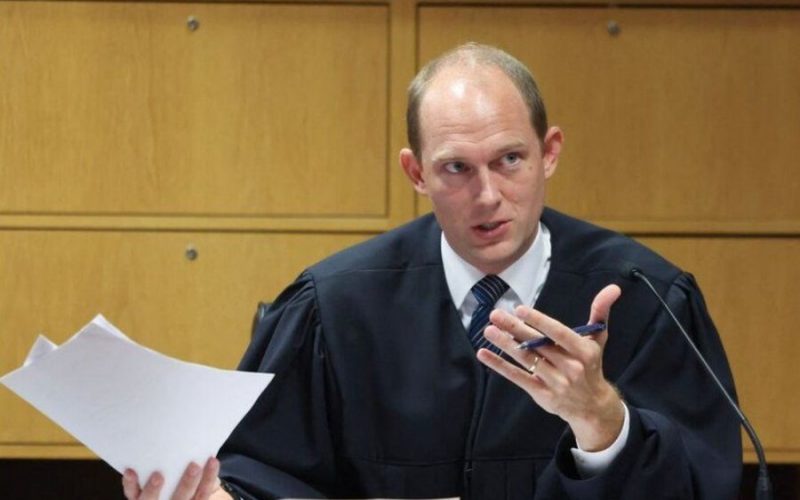A judge declined Friday to disqualify Fulton County District Attorney Fani Willis from the case against former President Donald Trump.
Judge Scott McAfee found that the defendants had “failed to meet their burden of proving that the District Attorney acquired an actual conflict of interest in this case through her personal relationship and recurring travels with her lead prosecutor.” However, he said that the record “highlights a significant appearance of impropriety that infects the current structure of the prosecution team,” stating that Nathan Wade must either withdraw or Willis and her whole office can choose to step aside to solve the problem.
McAfee wrote that disqualifying Willis was not necessary “when a less drastic and sufficiently remedial option is available.”
“The Court therefore concludes that the prosecution of this case cannot proceed until the State selects one of two options,” he wrote. “The District Attorney may choose to step aside, along with the whole of her office, and refer the prosecution to the Prosecuting Attorneys’ Council for reassignment. See O.C.G.A. § 15-18-5. Alternatively, SADA Wade can withdraw, allowing the District Attorney, the Defendants, and the public to move forward without his presence or remuneration distracting from and potentially compromising the merits of this case.”
Trump co-defendant Michael Roman alleged in a Jan. 8 motion that Willis financially benefited from awarding her romantic partner Nathan Wade a lucrative contract to work as special prosecutor on the case when he took her on vacations using money earned from his position.
Willis and Wade both denied the relationship began before he was hired, though a long-time friend of Willis, Robin Yeartie, testified that it began in 2019. They claimed the expenses were split roughly equally, with Willis paying him back in cash.
McAfee wrote that an “odor of mendacity remains” about the testimony of Willis and Wade.
“The Court is not under an obligation to ferret out every instance of potential dishonesty from each witness or defendant ever presented in open court,” he wrote. “Yet reasonable questions about whether the District Attorney and her hand-selected lead SADA testified untruthfully about the timing of their relationship further underpin the finding of an appearance of impropriety and the need to make proportional efforts to cure it.”
Steve Sadow, Trump’s lead defense counsel, said in a statement that they will “use all legal options available as we continue to fight to end this case, which should never have been brought in the first place.”
“While respecting the Court’s decision, we believe that the Court did not afford appropriate significance to the prosecutorial misconduct of Willis and Wade, including the financial benefits, testifying untruthfully about when their personal relationship began, as well as Willis’ extrajudicial MLK ‘church speech,’ where she played the race card and falsely accused the defendants and their counsel of racism,” Sadow said.
McAfee’s ruling addressed other grounds defendants used to call for disqualification, including Willis’ failure to disclose gifts from Wade on her financial disclosures and a church speech she gave in January blaming the allegations on race.
He called the speech “legally improper,” noting that this kind of public comment “creates dangerous waters for the District Attorney to wade further into.”
“The time may well have arrived for an order preventing the State from mentioning the case in any public forum to prevent prejudicial pretrial publicity, but that is not the motion presently before the Court,” he wrote.
As for witnesses, McAfee found Yeartie’s testimony raised doubts about the testimony of Willis and Wade but “lacked context and detail.” He found that he could not “place any stock in the testimony of Terrance Bradley,” Wade’s former law partner.
Texts revealed Bradley, who said on the witness stand that he “could not recall” details about their relationship, shared many details with defense attorney Ashleigh Merchant, even suggesting witnesses she could subpoena to confirm them.
“His inconsistencies, demeanor, and generally non-responsive answers left far too brittle a foundation upon which to build any conclusions,” McAfee wrote.
McAfee issued a ruling Wednesday dismissing six of the counts in the indictment that did not offer defendants “enough information to prepare their defenses intelligently.”
![]()

